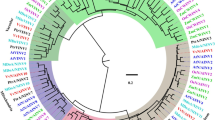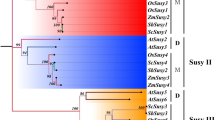Abstract
Key message
Sucrose invertase activity is positively related to osmotic and salt stress resistance in peanut.
Abstract
Sucrose invertases (INVs) have important functions in plant growth and response to environmental stresses. However, their biological roles in peanut are still not fully revealed. In this research, we identified 42 AhINV genes in the peanut genome. They were highly conserved and clustered into three groups with 24 segmental duplication events occurred under purifying selection. Transcriptional expression analysis exhibited that they were all ubiquitously expressed, and most of them were up-regulated by osmotic and salt stresses, with AhINV09, AhINV23 and AhINV19 showed the most significant up-regulation. Further physiochemical analysis showed that the resistance of peanut to osmotic and salt stress was positively related to the high sugar content and sucrose invertase activity. Our results provided fundamental information on the structure and evolutionary relationship of INV gene family in peanut and gave theoretical guideline for further functional study of AhINV genes in response to abiotic stress.






Similar content being viewed by others
Data availability
All data used in this study are included in this published article and its supplementary information files.
References
Albacete A, Cantero-Navarro E, Großkinsky DK, Arias CL, Balibrea ME, Bru R, Fragner L, Ghanem ME, González Mde L, Hernández JA, Martínez-Andújar C, van der Graaff E, Weckwerth W, Zellnig G, Pérez-Alfocea F, Roitsch T (2015) Ectopic overexpression of the cell wall invertase gene CIN1 leads to dehydration avoidance in tomato. J Exp Bot 66(3):863–878. https://doi.org/10.1093/jxb/eru448
Barratt DH, Derbyshire P, Findlay K, Pike M, Wellner N, Lunn J, Feil R, Simpson C, Maule AJ, Smith AM (2009) Normal growth of Arabidopsis requires cytosolic invertase but not sucrose synthase. Proc Natl Acad Sci USA 106(31):13124–13129. https://doi.org/10.1073/pnas.0900689106
Bertioli DJ, Cannon SB, Froenicke L, Huang G, Farmer AD, Cannon EK, Liu X, Gao D, Clevenger J, Dash S, Ren L, Moretzsohn MC, Shirasawa K, Huang W, Vidigal B, Abernathy B, Chu Y, Niederhuth CE, Umale P, Araújo AC, Kozik A, Kim KD, Burow MD, Varshney RK, Wang X, Zhang X, Barkley N, Guimarães PM, Isobe S, Guo B, Liao B, Stalker HT, Schmitz RJ, Scheffler BE, Leal-Bertioli SC, Xun X, Jackson SA, Michelmore R, Ozias-Akins P (2016) The genome sequences of Arachis duranensis and Arachis ipaensis, the diploid ancestors of cultivated peanut. Nat Genet 48(4):438–446. https://doi.org/10.1038/ng.3517
Bi Y, Sun Z, Zhang J, Liu E, Shen H, Lai K, Zhang S, Guo X, Sheng Y, Yu C, Qiao X, Li B, Zhang H (2018) Manipulating the expression of a cell wall invertase gene increases grain yield in maize. Plant Growth Regul 84(1):37–43. https://doi.org/10.1007/s10725-017-0319-7
Chen Z, Gao K, Su X, Rao P, An X (2015) Genome-wide identification of the invertase gene family in Populus. PLoS ONE 10(9):e0138540. https://doi.org/10.1371/journal.pone.0138540
Chen C, Chen H, Zhang Y, Thomas HR, Frank MH, He Y, Xia R (2020) TBtools: an integrative toolkit developed for interactive analyses of big biological data. Mol Plant 13(8):1194–1202. https://doi.org/10.1016/j.molp.2020.06.009
Chen B, Wang X, Lv J, Ge M, Qiao K, Chen Q, Zhang K, Wang J, Fan S, Ma Q (2021a) GhN/AINV13 positively regulates cotton stress tolerance by interacting with the 14-3-3 protein. Genomics 113(1 Pt 1):44–56. https://doi.org/10.1016/j.ygeno.2020.11.026
Chen L, Zheng F, Feng Z, Li Y, Ma M, Wang G, Zhao H (2021b) A vacuolar invertase CsVI2 regulates sucrose metabolism and increases drought tolerance in Cucumis sativus L. Int J Mol Sci 23(1):176. https://doi.org/10.3390/ijms23010176
Cheng L, Jin J, He X, Luo Z, Wang Z, Yang J, Xu X (2023) Genome-wide identification and analysis of the invertase gene family in tobacco (Nicotiana tabacum) reveals NtNINV10 participating the sugar metabolism. Front Plant Sci 14:1164296. https://doi.org/10.3389/fpls.2023.1164296
Dahro B, Wang F, Peng T, Liu JH (2016) PtrA/NINV, an alkaline/neutral invertase gene of Poncirus trifoliata, confers enhanced tolerance to multiple abiotic stresses by modulating ROS levels and maintaining photosynthetic efficiency. BMC Plant Biol 16:76. https://doi.org/10.1186/s12870-016-0761-0
Dahro B, Wang Y, Khan M, Zhang Y, Fang T, Ming R, Li C, Liu JH (2022) Two AT-Hook proteins regulate A/NINV7 expression to modulate sucrose catabolism for cold tolerance in Poncirus trifoliata. New Phytol 235(6):2331–2349. https://doi.org/10.1111/nph.18304
Deng X, Han X, Yu S, Liu Z, Guo D, He Y, Li W, Tao Y, Sun C, Xu P, Liao Y, Chen X, Zhang H, Wu X (2020) OsINV3 and its homolog, OsINV2, control grain size in rice. Int J Mol Sci 21(6):2199. https://doi.org/10.3390/ijms21062199
Edgar RC (2004) MUSCLE: multiple sequence alignment with high accuracy and high throughput. Nucleic Acids Res 32:1792–1797. https://doi.org/10.1002/ece3.10451
Finn RD, Coggill P, Eberhardt RY, Eddy SR, Mistry J, Mitchell AL, Potter SC, Punta M, Qureshi M, Sangrador-Vegas A, Salazar GA, Tate J, Bateman A (2016) The Pfam protein families database: towards a more sustainable future. Nucleic Acids Res 44(D1):D279–D285. https://doi.org/10.1093/nar/gkv1344
Ji X, Van den Ende W, Van Laere A, Cheng S, Bennett J (2005) Structure, evolution, and expression of the two invertase gene families of rice. J Mol Evol 60(5):615–634. https://doi.org/10.1007/s00239-004-0242-1
Ji X, Van den Ende W, Schroeven L, Clerens S, Geuten K, Cheng S, Bennett J (2007) The rice genome encodes two vacuolar invertases with fructan exohydrolase activity but lacks the related fructan biosynthesis genes of the Pooideae. New Phytol 173(1):50–62. https://doi.org/10.1111/j.1469-8137.2006.01896.x
Julius BT, Leach KA, Tran TM, Mertz RA, Braun DM (2017) Sugar transporters in plants: new insights and discoveries. Plant Cell Physiol 58(9):1442–1460. https://doi.org/10.1093/pcp/pcx090
Kang BH, Xiong Y, Williams DS, Pozueta-Romero D, Chourey PS (2009) Miniature1-encoded cell wall invertase is essential for assembly and function of wall-in-growth in the maize endosperm transfer cell. Plant Physiol 151(3):1366–1376. https://doi.org/10.1104/pp.109.142331
Kumar S, Stecher G, Tamura K (2016) MEGA7: molecular evolutionary genetics analysis version 7.0 for bigger datasets. Mol Biol Evol 33(7):1870–1874. https://doi.org/10.1093/molbev/msw054
Lescot M, Déhais P, Thijs G, Marchal K, Moreau Y, Van de Peer Y, Rouzé P, Rombauts S (2002) PlantCARE, a database of plant cis-acting regulatory elements and a portal to tools for in silico analysis of promoter sequences. Nucleic Acids Res 30(1):325–327. https://doi.org/10.1093/nar/30.1.325
Letunic I, Bork P (2021) Interactive Tree Of Life (iTOL) v5: an online tool for phylogenetic tree display and annotation. Nucleic Acids Res 49(W1):W293–W296. https://doi.org/10.1093/nar/gkab301
Letunic I, Doerks T, Bork P (2009) SMART 6: recent updates and new developments. Nucleic Acids Res 37(Database issue):D229–D232. https://doi.org/10.1093/nar/gkn808
Li B, Liu H, Zhang Y, Kang T, Zhang L, Tong J, Xiao L, Zhang H (2013) Constitutive expression of cell wall invertase genes increases grain yield and starch content in maize. Plant Biotechnol J 11(9):1080–1091. https://doi.org/10.1111/pbi.12102
Li J, Zeng R, Huang Z, Gao H, Liu S, Gao Y, Yao S, Wang Y, Zhang H, Zhang L, Chen T (2023) Genome-wide characterization of major latex protein gene family in peanut and expression analyses under drought and waterlogging stress. Front Plant Sci 14:1152824. https://doi.org/10.3389/fpls.2023.1152824
Liu YH, Offler CE, Ruan YL (2016) Cell wall invertase promotes fruit set under heat stress by suppressing ROS-independent cell death. Plant Physiol 172(1):163–180. https://doi.org/10.1104/pp.16.00959
Liu X, Su L, Li L, Zhang Z, Li X, Liang Q, Li L (2023) Transcriptome profiling reveals characteristics of hairy root and the role of AhGLK1 in response to drought stress and post-drought recovery in peanut. BMC Genomics 24(1):119. https://doi.org/10.1186/s12864-023-09219-2
Lv J, Chen B, Ma C, Qiao K, Fan S, Ma Q (2021) Identification and characterization of the AINV genes in five Gossypium species with potential functions of GhAINVs under abiotic stress. Physiol Plant 173(4):2091–2102. https://doi.org/10.1111/ppl.13559
Minami A, Kang X, Carter CJ (2021) A cell wall invertase controls nectar volume and sugar composition. Plant J 107(4):1016–1028. https://doi.org/10.1111/tpj.15357
Mou Y, Sun Q, Yuan C, Zhao X, Wang J, Yan C, Li C, Shan S (2022) Identification of the LOX gene family in peanut and functional characterization of AhLOX29 in drought tolerance. Front Plant Sci 13:832785. https://doi.org/10.3389/fpls.2022.832785
Ruan YL (2014) Sucrose metabolism: gateway to diverse carbon use and sugar signaling. Annu Rev Plant Biol 65:33–67. https://doi.org/10.1146/annurev-arplant-050213-040251
Ruan YL (2022) CWIN-sugar transporter nexus is a key component for reproductive success. J Plant Physiol 268:153572. https://doi.org/10.1016/j.jplph.2021.153572
Ruan YL, Jin Y, Yang YJ, Li GJ, Boyer JS (2010) Sugar input, metabolism, and signaling mediated by invertase: roles in development, yield potential, and response to drought and heat. Mol Plant 3(6):942–955. https://doi.org/10.1093/mp/ssq044
Su T, Han M, Min J, Chen P, Mao Y, Huang Q, Tong Q, Liu Q, Fang Y (2018) Genome-wide survey of invertase encoding genes and functional characterization of an extracellular fungal pathogen-responsive invertase in Glycine max. Int J Mol Sci 19(8):2395. https://doi.org/10.3390/ijms19082395
Vargas W, Cumino A, Salerno GL (2003) Cyanobacterial alkaline/neutral invertases. Origin of sucrose hydrolysis in the plant cytosol? Planta 216(6):951–960. https://doi.org/10.1007/s00425-002-0943-x
Wan H, Wu L, Yang Y, Zhou G, Ruan YL (2018) Evolution of sucrose metabolism: the dichotomy of invertases and beyond. Trends Plant Sci 23(2):163–177. https://doi.org/10.1016/j.tplants.2017.11.001
Wang L, Ruan YL (2012) New insights into roles of cell wall invertase in early seed development revealed by comprehensive spatial and temporal expression patterns of GhCWIN1 in cotton. Plant Physiol 160(2):777–787. https://doi.org/10.1104/pp.112.203893
Wang YJ, Zhen XH, Zhou YJ, Wang YL, Hou JY, Wang X, Li RM, Liu J, Hu XW, Geng MT, Yao Y, Guo JC (2022) MeNINV1: an alkaline/neutral invertase gene of Manihot esculenta, enhanced sucrose catabolism and promoted plant vegetative growth in transgenic Arabidopsis. Plants (basel) 11(7):946. https://doi.org/10.3390/plants11070946
Wang J, Chitsaz F, Derbyshire MK, Gonzales NR, Gwadz M, Lu S, Marchler GH, Song JS, Thanki N, Yamashita RA, Yang M, Zhang D, Zheng C, Lanczycki CJ, Marchler-Bauer A (2023) The conserved domain database in 2023. Nucleic Acids Res 51(D1):D384–D388. https://doi.org/10.1093/nar/gkac1096
Yan W, Wu X, Li Y, Liu G, Cui Z, Jiang T, Ma Q, Luo L, Zhang P (2019) Cell wall invertase 3 affects cassava productivity via regulating sugar allocation from source to sink. Front Plant Sci 10:541. https://doi.org/10.3389/fpls.2019.00541
Yang W, Chen S, Cheng Y, Zhang N, Ma Y, Wang W, Tian H, Li Y, Hussain S, Wang S (2020) Cell wall/vacuolar inhibitor of fructosidase 1 regulates ABA response and salt tolerance in Arabidopsis. Plant Signal Behav 15(4):1744293. https://doi.org/10.1080/15592324.2020.1744293
Yasmeen A, Shakoor S, Azam S, Bakhsh A, Shahid N, Latif A, Shahid AA, Husnain T, Rao AQ (2022) CRISPR/Cas-mediated knockdown of vacuolar invertase gene expression lowers the cold-induced sweetening in potatoes. Planta 256(6):107. https://doi.org/10.1007/s00425-022-04022-x
Zhang Z (2022) KaKs_Calculator 3.0: calculating selective pressure on coding and non-coding sequences. Genom Proteom Bioinform 20(3):536–540. https://doi.org/10.1016/j.gpb.2021.12.002
Zhu C, Yang K, Li G, Li Y, Gao Z (2021) Identification and expression analyses of invertase genes in moso bamboo reveal their potential drought stress functions. Front Genet 12:696300. https://doi.org/10.3389/fgene.2021.696300
Zhuang W, Chen H, Yang M, Wang J, Pandey MK, Zhang C, Chang W-C, Zhang L, Zhang X, Tang R, Garg V, Wang X, Tang H, Chow C-N, Wang J, Deng Y, Wang D, Khan AW, Yang Q, Cai T, Bajaj P, Wu K, Guo B, Zhang X, Li J, Liang F, Hu J, Liao B, Liu S, Chitikineni A, Yan H, Zheng Y, Shan S, Liu Q, Xie D, Wang Z, Khan SA, Ali N, Zhao C, Li X, Luo Z, Zhang S, Zhuang R, Peng Z, Wang S, Mamadou G, Zhuang Y, Zhao Z, Yu W, Xiong F, Quan W, Yuan M, Li Y, Zou H, Xia H, Zha L, Fan J, Yu J, Xie W, Yuan J, Chen K, Zhao S, Chu W, Chen Y, Sun P, Meng F, Zhuo T, Zhao Y, Li C, He G, Zhao Y, Wang C, Kavikishor PB, Pan R-L, Paterson AH, Wang X, Ming R, Varshney RK (2019) The genome of cultivated peanut provides insight into legume karyotypes, polyploid evolution and crop domestication. Nat Genet 51(5):865–876. https://doi.org/10.1038/s41588-019-0402-2
Funding
This work has been jointly supported by the following grants: The Key Research and Development Project of Shandong Province (2020LZGC001); The Natural Science Foundation of Shandong Province, China (ZR2021QC140); The National Mega Project of GMO Crops of China (2016ZX08004-002-006); The National Natural Science Foundation of China (32071733); The Cooperation Project of University and Local Enterprise in Yantai of Shandong Province (2021XDRHXMPT09).
Author information
Authors and Affiliations
Contributions
Juan Zhang and HongXia Zhang designed the experiments; Yaru Zhang, Wenwen Xue, Yu Jin, Hongfei Zhao and Yibo Wang performed the experiments; Tingting Mao, Yaru Zhang, Shengnan Wang, Shengjie Zhuo, Feifei Gao and Yanping Su analysed the data; Chunyan Yu and Xiaotong Guo supervised the experiment; Yuting Sheng supported the experiment. Tingting Mao wrote the manuscript; Juan Zhang and Hongxia Zhang revised the manuscript. All authors read and approved the paper.
Corresponding authors
Ethics declarations
Conflict of interest
The authors have no relevant financial or non-financial interests to disclose.
Additional information
Communicated by Chun-Hai Dong.
Publisher's Note
Springer Nature remains neutral with regard to jurisdictional claims in published maps and institutional affiliations.
Supplementary Information
Below is the link to the electronic supplementary material.
Rights and permissions
Springer Nature or its licensor (e.g. a society or other partner) holds exclusive rights to this article under a publishing agreement with the author(s) or other rightsholder(s); author self-archiving of the accepted manuscript version of this article is solely governed by the terms of such publishing agreement and applicable law.
About this article
Cite this article
Mao, T., Zhang, Y., Xue, W. et al. Identification, characterisation and expression analysis of peanut sugar invertase genes reveal their vital roles in response to abiotic stress. Plant Cell Rep 43, 30 (2024). https://doi.org/10.1007/s00299-023-03123-5
Received:
Accepted:
Published:
DOI: https://doi.org/10.1007/s00299-023-03123-5




